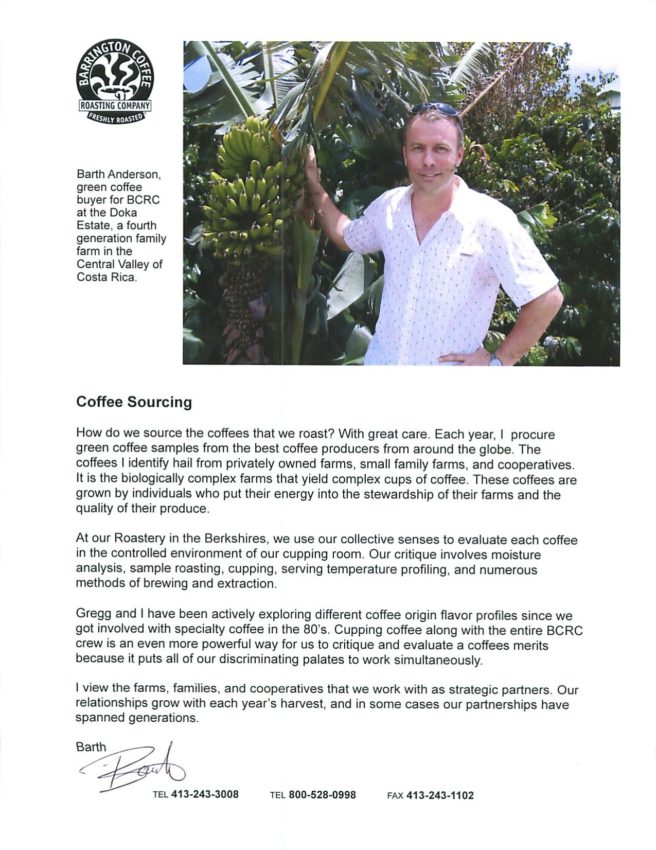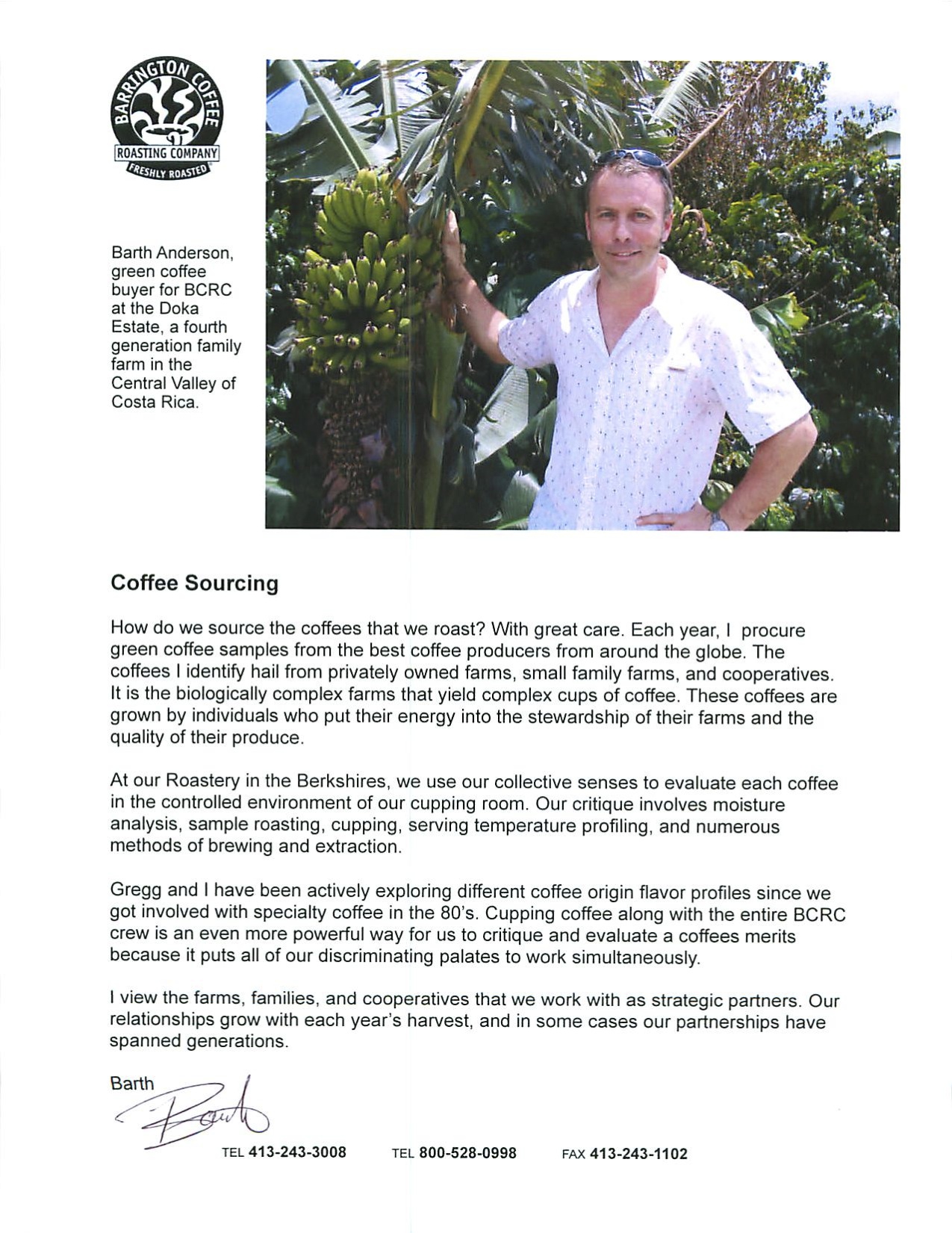
We have big ambitions with Clover. One of the things we’re trying to do is create a brand that is as honest about our shortcomings as we are about our triumphs. We’re proud of what we do, at the same time we’re working to improve every detail.
I’m sharing recent correspondence with Barth of Barrington Coffee Roasters. This is a beautiful example of what we’re looking to foster. The specificity, depth, and honesty in Barth’s response is just fantastic.
I’ve been asking Barth for more information about our beans, he sent the flyer above.
I asked for more. He sent sent a bit more. I asked for more. We ask our suppliers to be patient. Barth sent this:
Ayr,
Here’s some more about Casa Ruiz…plus some other related agenda.
Casa Ruiz S.A. is the name of the Ruiz family’s business. It is owned and operated by the family; Father, Plenio Sr. 86, Daughter, Maria, and Son, Plenio Jr. I’d say Plenio Jr. is around 40 years old. Not taking a stab at Maria’s age.
The Ruiz’s are God fearing, peaceable people and they have always been an absolute pleasure to work with. I feel VERY lucky to work with them.
The Ruiz’s actually own several farms (Boutet, Panamaria, La Berlina, Maunier, Horqueta). Our Main Menu offering at a Vienna Roast was from the Panamaria farm for five years. Last year they prepared a blend of farms and varietals that they called Classico. It actually includes coffees from farms other than their own that are still within the Boquete Valley. This coffee cupped better than Panamaria. We bought that one and that is what you are drinking now.
We have worked with Casa Ruiz coffees for eleven years, since 1998. Our relationship grew considerably with them when we created the Vienna Roast. That was around seven years ago.
Part of the reason their coffee is so good is related to their involvement in the entire process. They grow coffee, they have a mill to prepare the coffee, and they are strongly allied with the indigenous Mayan community members in Boquete who help them maintain he farms and pick the cherry. The Mayan community make their farms possible. And, in turn, the Ruiz family supports the Mayan community.
Some years we will spotlight another one of their farms as a Limited. Their coffees have received numerous Panama Cupping Competition awards over the years. They have one farm that is fully certified organic. Their methodology for growing on their other farms holds similar principles, but they do not pursue certification for them largely because their coffee sells based upon its cup quality alone.
Because we have considerable water under the bridge with the Ruiz Family we get first shot at their offerings each year. We actually have already contracted with them for what will be next years offerings, provided cup quality rings through. All indications are as such. By making contractual obligations to them at this stage of the game while the coffee is being grown, we agree to pay the price they request for a certain amount of coffee. They can then count on us being there to back up the contract when the coffee comes to bear. (Sometimes we invest ahead in a project with a farm, but not with the Ruiz family. They are well established business and this would essentially be unnecessary weigh on our relationship.)
Our team visited Casa Ruiz a bunch several years ago. I’d love to go there right now. We have a standing invitation, like we do with many of the growers that we work with. Because we are committed to being a hands on roasting company, I also need to be here to do my work. I do make it a priority to direct friends and customers to visit the farm. In fact, my very good friend Mark Chenevert (from Abington, MA) is in Boquete right now. The overwhelming beauty of the environment there is captivating. A nearby farm called Kotowa, functions as an ecotourism destination. It is all a paradise. Purchasing their coffee helps to sustain this delicate ecosystem.
Primary cherry picking time is from November to February. We receive pre-shipment samples from the farm in December and sometimes into January. The coffee we approve typically arrives in January. We then get one final opportunity to evaluate the coffee once it has made the trek through the Caribbean. Once the coffee lands and we approve it, we will further evaluate it for its quality. At this point we will decide if it has settled down appropriately from preparation and travel (hugely critical). When we feel it is ready, we then will seal the coffee up to maintain its moisture content throughout the year.
An MIT grad gets the credit for helping us to seal coffee like this on a large scale. Phillip Villars ring a bell? Long shot, I’m guessing, but he is the one who has pioneered this technology for storing multiple bags of coffee with essentially 0% moisture loss for eight months, plus. We have been doing this in house on n a small scale for many years prior. We continue to do this with applicable coffees here at the Roastery on a regular basis.
Next time you hear someone harping about “seasonal coffee”, please bear in mind that there are sensible methods for offering a great coffee throughout its harvest year and beyond. There’s nothing wrong with offering coffee on a seasonal cycle, but there are other ways to celebrate the best coffees grown each year for extended periods of time. We have figured it out. It is called hermetic sealing with a moisture barrier. I see the rest of that seasonal coffee offering chatter as an attempt at gaining marketing leverage. The proof is in the cup.
Panama is considered very small in regards to global production. They are WAY out of the top 20. Costa Rican makes Panama look puny in terms of annual output.
The Geisha cultivar has brought fame, if not fortune, to Panamanian coffee. One particular green coffee from another family farm that we have worked with (Hacienda Esmeralda) fetched $130/pound green on an internet auction. We bid each year against buyers from around the world for particular coffees that deserve merit as part of certain outreach programs. The Cup of Excellence program started by George Howell is one such example.
Despite the glitz and the glory, Panamanian coffee production is on the decline and if it were not for our history of business with the Ruiz family, we probably would not be able to meet our needs for next year. Real estate among expat communities is vying for arable coffee land. Fortunately there is great integrity in our relationship and we’re hoping everything will come together for next year. Being an agricultural product, now even further jeopardized by the increase of intensity of global climactic events, no contract can ever guarantee the outcome of the harvest. We shall see.
Now that you know all about the coffee business (Ha!), please feel free to continue the Q & A. There is nothing simple about any of what we do. Each coffee we work with has a basket full of complexities. Strong relationships, shared values about environmental stewardship, financial and educational community support, trust and integrity are the only glue in the matrix that I know of.
